
This Newsletter’s Main Topics
Hundreds of Students & Parents Enjoy Edu-Family 2024
Emerging Leaders Program Celebrates Graduation of High School Seniors
Edu-Futuro Television Program Wins Emmy Award for Coverage of Fentanyl Crisis
Financial Tips: Identity Theft
Health & Wellness: Tips on Talking to Your Kids About Vaping
Hundreds of Students & Parents Enjoy Edu-Family 2024 at Marymount University
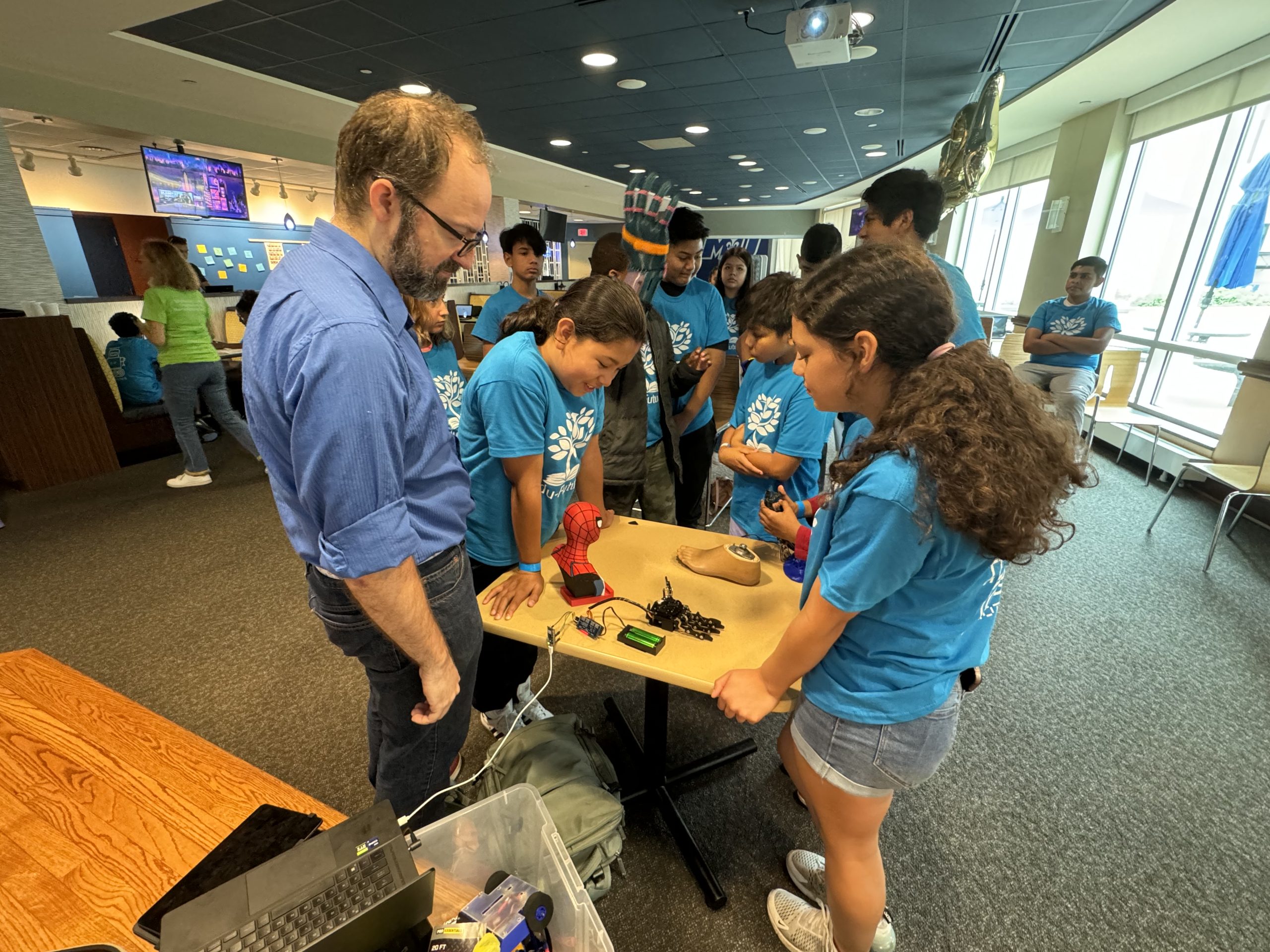
On Saturday, July 13, 2024, Edu-Family 2024 became one of the best-attended events in the 25-year history of Edu-Futuro, as more than 400 students, parents, volunteers, and staff joined us for a full day of educational activities in the Northern Virginia campus of Marymount University. Throughout the day, small groups of students participating in our Emerging Leaders Program (ELP) had the chance to rotate through different learning stations and career panels designed to encourage high school graduation, college readiness and postsecondary enrollment. Younger students took part in the fun and dynamic robotics games prepared by Dr. Eric Joseph Bubar, Professor of Engineering at Marymount University.
Parents were also an integral part of Edu-Family 2024, participating in training sessions focused on providing information on the availability of scholarships and financial aid, the importance of community college, and how to budget and manage the cost of a college education. All our students and parents were also given a guided tour of the Marymount campus.
“Once again, our Edu-Family event served to show just how important education is to immigrant and Latino parents,” said Jorge E. Figueredo, Executive Director of Edu-Futuro. “On a beautiful Saturday, hundreds of parents decided to spend an entire day with their children, talking about education, and learning how the college education of even one student can impact the future wellbeing of the entire family. I am extremely grateful to Dr. Irma Becerra-Fernández, President of Marymount University, for partnering with us on Edu-Family 2024. The great majority of families who participated in the event had never visited a college campus, and we believe that the opportunity to tour the beautiful Marymount grounds and facilities opened a brand-new world of opportunity for our students and parents.”
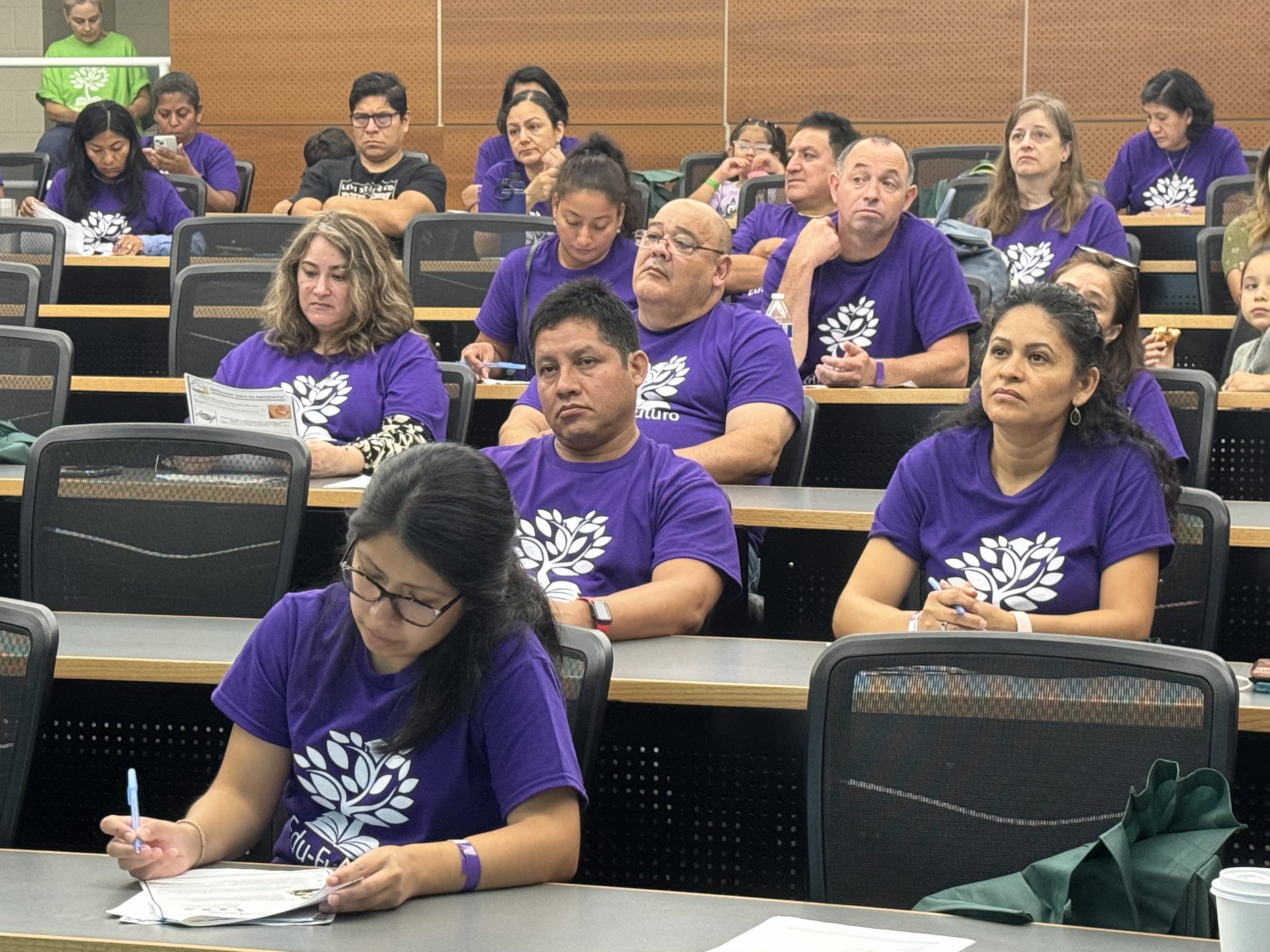
During Edu-Family 2024, Edu-Futuro students worked with our staff to learn strategies that will help them stay on the college track, and make concrete decisions about their future. Edu-Family participants also learned how to write a professional resume, while being inspired by the excellent guests in our Career Panel, which included: Emmanuel Caudillo, Senior Advisor to the White House Initiative on Advancing Educational Equity; Ahmed Hassan, Business Analyst with Deloitte Consulting; and Ashley Travitz, Founder of Pegasus Consulting.
Additionally, Edu-Futuro youth participated in speech and essay competitions that provided a total of $4,000 in scholarships to three winning students. Seven universities participated in our signature College Fair, which helped both students and parents learn about the local educational options open to all our families. We would like to express our gratitude to the college representatives of the George Mason University Advance Program, Marymount University, NOVA DREAMers Advocate, James Madison University, NewU, Old Dominion University, and the University of Mary Washington.
For more information on Edu-Futuro’s Emerging Leaders Program, please contact Susana Carpio, Youth Programs Team Lead, at susanacarpio@edu-futuro.org. Edu-Futuro’s Emerging Leaders Program (ELP) is supported in part by a grant from the Verizon Foundation.
Emerging Leaders Program Celebrates Graduation of High School Seniors
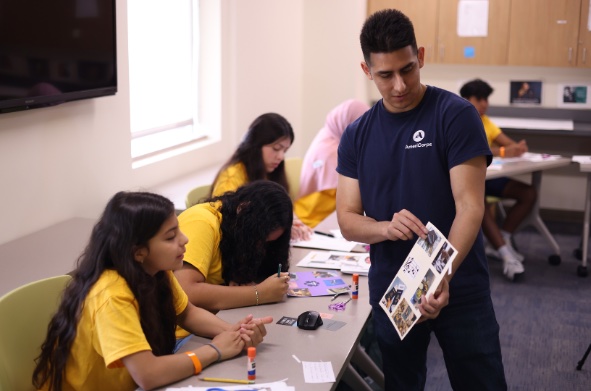
The Edu-Family event ended on a high note, as over 200 youth and parents gathered to celebrate the event’s final activity — the graduation of 49 students from our life-changing Emerging Leaders Program, Part II (ELP-II), which provides high school seniors with educational workshops, and year-round mentors who work closely with participants to complete applications for college enrollment, scholarships, and financial aid. Although our students are still receiving acceptance letters from colleges, we are very proud to announce that, thus far, our ELP-II students have all graduated from high school, and the outstanding group has been collectively offered $4,569,606 in scholarships and financial aid for their four-year education.
This remarkable accomplishment is a testament to the commitment and determination of our 49 students, who have all overcome significant challenges to pursue their dream of a college education. The success of our youth is also a testament to the hard work and dedication of our Youth Programs Team Lead, Susana Carpio, and our wonderful group of AmeriCorps members, who are largely responsible for mentoring and supporting our students during the academic year. We estimate that Edu-Futuro staff, and our AmeriCorps members, spent approximately 6,300 work hours this past year helping to complete admission forms, provide academic support, and identify scholarship and financial aid opportunities for our students.
Here are two testimonies from our graduating ELP-II students:
David Ortiz graduated from Freedom High School in Prince William County. He has been accepted to the University of Virginia, where he will major in Business Administration. —
“Edu Futuro has been a guiding light in my pursuit of higher education. Under the mentorship of individuals like Natalie Gutiérrez and Anthony Torrelio, I’ve been equipped with the knowledge and support necessary to navigate the complexities of the college application process. Their guidance has been invaluable, and I am deeply thankful for their dedication to empowering students like myself.
Through Edu Futuro, I’ve not only gained practical insights into financial aid opportunities, but have also had the privilege of connecting with mentors who have inspired me to dream big and reach for the stars. It’s more than just a program; it’s a community of support and encouragement that has bolstered my confidence and fueled my determination to succeed.
With the help of ELP and their support, I was able to get into all the seven colleges I applied to, including William Mary and Virginia Tech. However, I decided to go with the University of Virginia. Furthermore, ELP mentors provided me with resources and information, which resulted in being offered a total of $412,000 in scholarship money and grants.
Looking ahead, my vision for the future is one filled with opportunities for growth and exploration. One of my aspirations is to study abroad in a country in South or Central America, immersing myself in the rich tapestry of Hispanic culture and expanding my horizons. This experience, I believe, will not only deepen my understanding of my heritage, but also enable me to make meaningful contributions to my community.
I am reminded of the words of Nelson Mandela: ‘Education is the most powerful weapon which you can use to change the world.’ With the support of programs like Edu Futuro, and the unwavering encouragement of mentors, I am committed to harnessing the power of education to create positive change in the world around me.”
Karen Bailón graduated from Wakefield High School in Arlington County. She has been accepted to Virginia Commonwealth University, where she will major in Photography. —
“My name is Karen Bailón. I currently live in Arlington, and attend Wakefield High School. My plans after school are to attend Virginia Commonwealth University, where I will be studying photography. Originally, I am from Ecuador. I have been in the U.S. for three years, and I am so proud of my culture and being Ecuadorian. I will say that learning a new language starting from zero is very difficult, just like learning a new culture, being in a new community, and even adapting to a new lifestyle. I think that if you want to grow and achieve your goals, you have to be a determined person. When I came here, I didn’t know English, or anything about college. What I did know, was that I had to learn fast so that I could help my parents, since they don’t speak English. To me, helping my parents is an honor, and we should all be proud of being able to help our families.
Last year was the year when I started thinking about college, and how I might be able to submit my applications. If I’m honest, I was scared because I realized that I didn’t have knowledge about the steps I needed to take to apply to college. My mom was also frustrated because she didn’t know how to help. Then my mother’s friend told her about Edu-Futuro. She told her about a program that could help her daughter, and I remember going to my first Edu-Futuro event. That program was so helpful! I learned things that no one had told me before, like realistic information about the steps you needed to take in order to enroll in a university. Before, I had only received superficial information about college, but the Edu-Futuro event was like opening my eyes, like answered prayers.
As I said before, I had no one to ask about college, or anyone who could help me with the application process. In the ELP-II program, they gave me a mentor who would help me for an entire year with the application process for college and for scholarships. My mentor helped me with the questions I had, and how to find scholarships and fill out my financial aid forms. I want to publicly thank and honor my mentor, Natalie Gutiérrez, for all the help, understanding, empathy, and patience that she showed me during all this time. I am very grateful to Edu-Futuro for helping me with the tools I needed to create my path towards the future. Thank you for the great impact you made in my life! There are no words to describe how thankful I am to Edu-Futuro and the ELP-II program.”
Edu-Futuro Television Program Wins Emmy Award for Coverage of Fentanyl Crisis
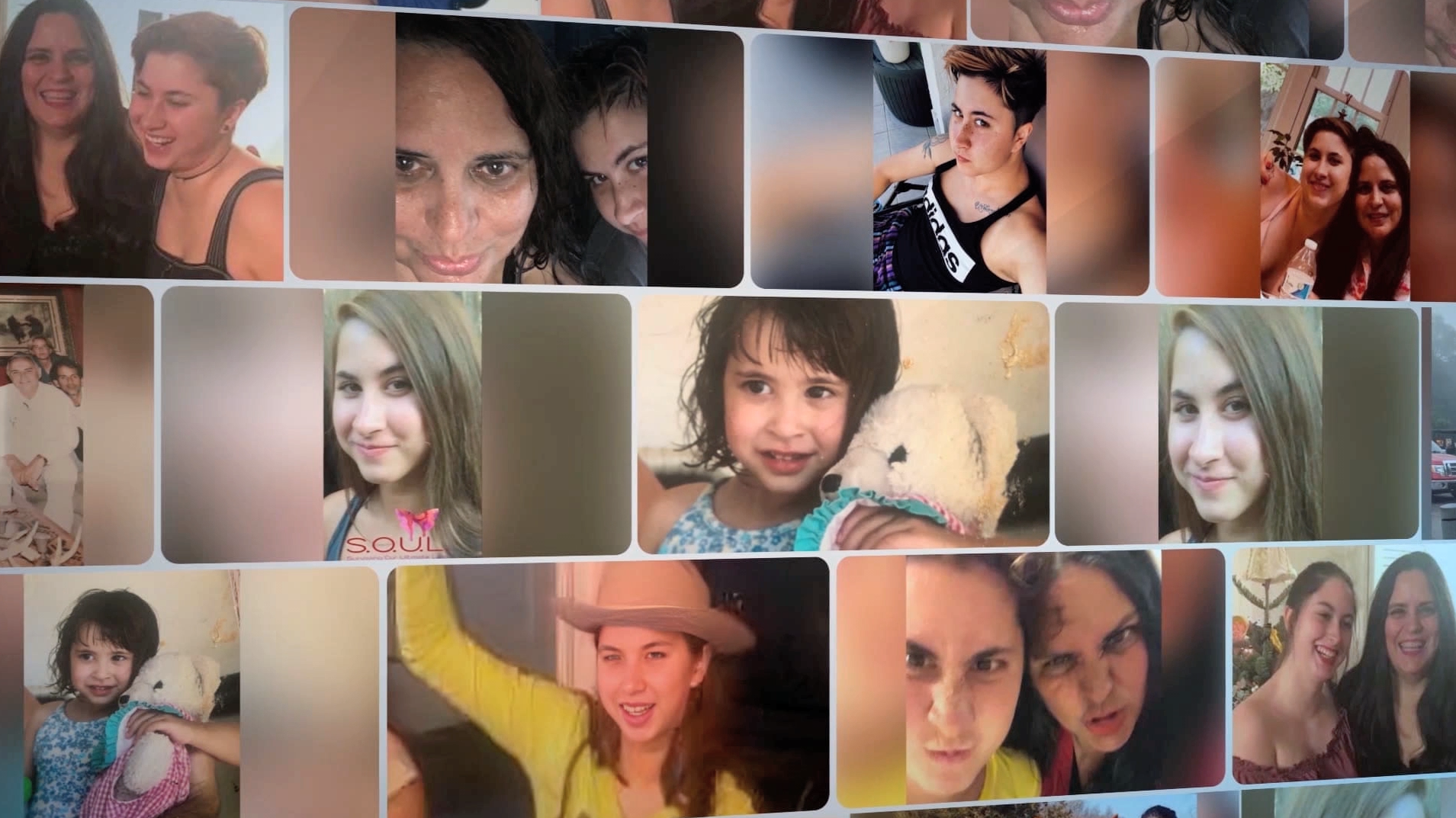
Línea Directa, Edu-Futuro’s public service television series, won an Emmy Award on Saturday, June 22, 2024, at the 66th Emmy Awards Gala held by the National Capital Chesapeake Bay Chapter of the National Academy of Television Arts and Sciences. Edu-Futuro won the coveted honor in the category, Societal Concerns (Long Form), for the production of a half-hour program focusing on the fentanyl crisis that has led to the death of many adolescents across the Washington region during the past two years.
The winning Línea Directa program featured an interview with Elena Suárez, whose daughter, Colette, tragically died from an accidental fentanyl overdose in 2020. “We are extremely grateful to Ms. Suárez for her grace and generosity in sharing the story of her daughter, Colette,” said Eduardo López, Edu-Futuro Communications & Programs Manager, and Línea Directa Founder/Producer. “The moving interview conducted by our Associate Producer and Host, Andrea Sarralde, gave thousands of Latino families the opportunity to see just how dangerous fentanyl is to the life and health of our community. Our hope is that our program encouraged Latino parents to sit down and talk to their children about the fact that the opioid pills being sold throughout the Washington region to unsuspecting teens could easily be contaminated with fentanyl — a drug so powerful that just two 2 milligrams, or 10-15 grains of salt, are enough to kill an adult human being.”
According to the Virginia Department of Health, studies indicate that approximately 99% of all fentanyl-related overdose deaths are accidents, and that fentanyl kills one person every 8.57 minutes in the United States. Often called the “Invisible Killer,” fentanyl is a synthetic opioid that is up to 50 times stronger than heroin, and 100 times stronger than morphine. In most cases, police officials have found that adolescents buy opioid pills thinking that the drug will help them relax or deal with stressful situations. The harsh reality, however, is that the counterfeit pills were made in illegal processing plants where the possibility of fentanyl contamination is extremely high.
The Emmy-winning program is one of three recent Línea Directa shows dedicated to the issue of the fentanyl crisis among Latino adolescents. Another program featured lengthy interviews with psychologist Gabriela Romo, as well as four students from Wakefield High School in Arlington, who offered their own perspectives on the increase in teen opioid use, and their reactions after a 14-year-old classmate tragically died from a fentanyl overdose. The other Línea Directa program focusing on the opioid/fentanyl issue featured psychologist Claudia Campos and community leader, Janeth Valenzuela.
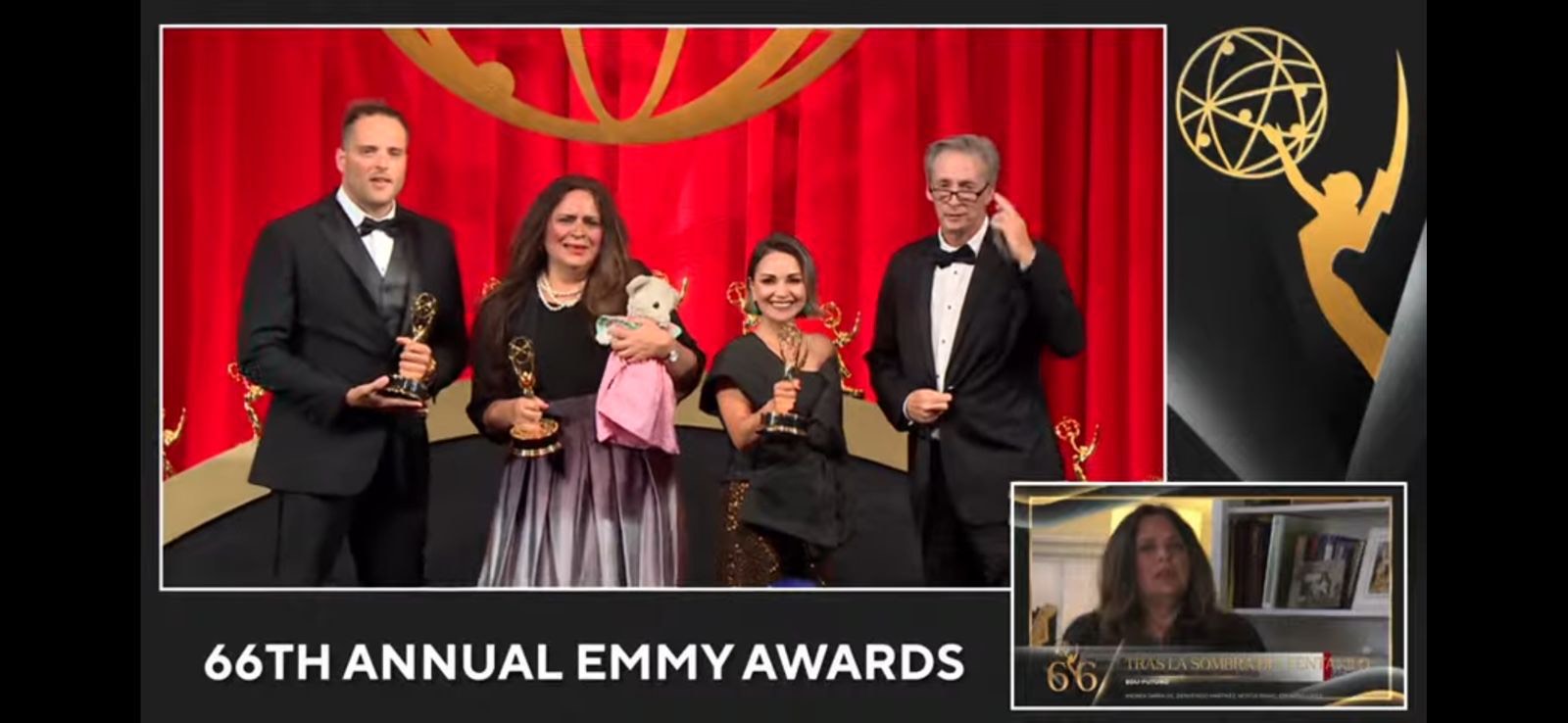
Since 2019, Edu-Futuro has been the proud home of Línea Directa, one of the nation’s longest-running weekly Spanish-language television programs dedicated to public service. For nearly 35 years, Línea Directa has operated as a crucial link between immigrant families and trusted information on public health, education, and a multitude of social service issues. A unique media partnership with NBC4-Washington, allows Edu-Futuro to air Línea Directa on Saturday mornings, at 11:00 a.m., on the region’s leading Latino station, Telemundo 44.
The Línea Directa team members who took home the Emmy Award were: Producer, Eduardo López; Host, Andrea Sarralde; Editor, Nestor Bravo; and Camera Operator, Bienvenido Martínez. Our Línea Directa program on the fentanyl crisis was made possible by a generous grant from the Montgomery County Council in Maryland. For more information on the Línea Directa public service television series, please contact Eduardo López, Communications & Programs Manager, at eduardo@edu-futuro.org.
The AmeriCorps VISTA Corner:
Welcome Kaitlin Mays & Dana Villasenor
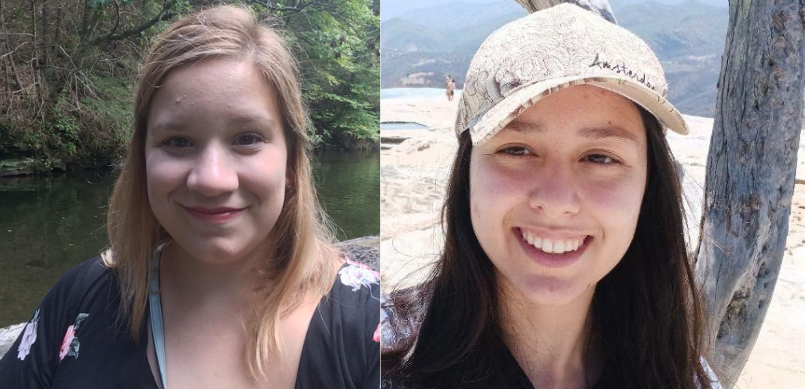
This year, Edu-Futuro will be receiving the invaluable help of six AmeriCorps VISTA members who will play critical roles in a variety of capacity-building projects, including the updating of our beneficiary database, conducting research on funding opportunities, and developing brand-new program curricula for students and parents. This month, we would like to welcome our newest Americorp VISTA Members — Kaitlin Mays & Dana Villasenor. Kaitlin Mays, who started as a VISTA Grant Writer at Edu-Futuro in June, was excited to join us in time for Edu-Family 2024.
“It was an amazing day of seeing the students, the parents, and their families come together. I was working in the childcare room for most of the day, and the children were excited and proud of their parents and their siblings. Anytime someone would pass by the childcare room the kids would look to see and point out their parents or siblings. It was heartwarming to interact with the kids and learn more about their families. I have worked in the nonprofit sector for four years as a Development Associate, Corporate Relations Manager, and Manager of Grants and Foundational Giving. I am excited to be here at Edu-Futuro and raise money to fund all of the wonderful programs offered to our students and parents.”
Dana Villasenor, our Curriculum Design VISTA, will be developing our youth program curriculum with an emphasis on health education. Dana, alongside Edu-Futuro’s Youth Program team, helped prepare the robotics workshop featured at our Edu-Family event as well. She shares her experience developing program curriculum at Edu-Futuro for the first time:
“The goal of the robotics program is to help children ages 10 to 14 develop soft skills, such as teamwork, by working on challenging topics like coding. An added benefit of this program is that it drives children towards an interest in STEM careers. For this cycle, the organization decided to add a medical component. The challenge for me was to create a set of activities that left children interested in all three areas (robotics, STEM, and medicine), was engaging enough for them to feel like they did something, but that was also appropriate for beginners who had never coded before. The spirit of competition baked into the activities pushed the kids to work in teams with a time crunch. They forgot to ‘be cool’ and started engaging with the content. They all did great and learned the basics of coding. The robotics program has the potential to guide young minds toward an interest in STEM, and teach them about cooperation and socialization.”
For more information on Edu-Futuro’s AmeriCorps VISTA program, please contact Joy Harvey, our VISTA Team Leader, at vistaleader@edu-futuro.org.
Financial Tips : Identity Theft

What do I do if I’ve been a victim of identity theft?
If you are a victim of identity theft, place fraud alerts or security freezes on your credit reports, file a report at IdentityTheft.gov, and take steps to protect your credit history and finances.
Closing accounts and contacting the police — If you are currently dealing with identity theft, there are important steps you can take right away-including closing your accounts and reporting the identity theft to the police. Visit the Department of Justice and IdentityTheft.gov to learn more.
Protecting your credit — Contact any one of these three nationwide credit reporting companies Equifax, Experian, or Transunion to place fraud alerts and security freezes on your credit reports:
- Equifax Alerts: (800) 685-1111
- Experian Fraud Center: (888) 397-3742
- Transunion Fraud Alert: (888) 909-8872
Fraud alerts — A fraud alert requires creditors, who check your credit report, to take steps to verify your identity before they open a new account, issue an additional card, or increase the credit limit on an existing account based on a consumer’s request. When you place a fraud alert on your credit report at one of the nationwide credit reporting companies, it must notify the others. There are two main types of fraud alerts: initial fraud alerts and extended alerts. Servicemembers also have the option of an active-duty alert.
Initial fraud alerts — You can place an initial fraud alert on your credit report if you believe you are, or are about to become, a victim of fraud or identity theft. Credit reporting companies will keep that alert on your file for one year. After one year, the initial fraud alert will expire and be removed. You have the option to place another fraud alert at that time.
When you place an initial fraud alert, creditors must take reasonable steps to make sure the person making a new credit request in your name is you before granting that request. If you provide a telephone number, the creditor must call you or take reasonable steps to verify whether you are the person making the credit request before granting the credit. When you place an initial fraud alert on your file, you’re entitled to order one free copy of your credit report from each of the nationwide credit reporting companies. These free reports do not count as your free annual report from each credit reporting company.
Extended alerts — If your identity has been stolen and you have filed an identity theft report at IdentityTheft.gov, you can place an extended alert on your credit report. An extended alert is good for seven years. If you have an extended alert, a creditor must contact you in person, on the telephone, or through another contact method you choose to verify if you are the person making the credit request before extending new credit.
When you place an extended fraud alert on your file, you’re entitled to order two free copies of your credit report from each nationwide credit reporting company over a 12- month period. Your name will also be removed for five years from the nationwide credit reporting companies’ pre-screen marketing lists for credit offers and insurance.
Security freezes — Under federal law, you can freeze and unfreeze your credit record for free at the three nationwide credit reporting companies – Experian, TransUnion, and Equifax. A security freeze, also called a credit freeze, stops new creditors from accessing your credit file until you lift the freeze. The federal law requiring free security freezes does not apply to someone who requests your credit report for employment, tenant-screening, or insurance purposes.
Unlike fraud alerts, if you place a security freeze with one credit reporting company, they will not notify the other credit reporting companies. You must contact each credit reporting company individually if you would like to place a security freeze with all three nationwide credit reporting companies. Because most businesses will not open credit accounts without checking your credit report, a freeze can stop identity thieves from opening new accounts in your name. Be mindful that a freeze doesn’t prevent identity thieves from taking over existing accounts.
Blocking or removing fraudulent information from your consumer report — If you’ve been a victim of identity theft, you can also get credit reporting companies to remove fraudulent information and debts from your credit report, which is called blocking. To do this, you must send the credit reporting companies:
- An identity theft report, which can be done through IdentityTheft.gov
- Proof of your identity
- A letter identifying the fraudulent debts and information on your credit report
Through IdentityTheft.gov, you can also get a sample letter to send to the credit reporting companies. Remember that you can use identity theft reports only for debts that are the result of identity theft. Credit reporting companies may decline to block or rescind a block if you make a material misrepresentation of fact about being a victim of identity theft or if you got goods, services, or money as a result of the blocked transaction. Within four business days after receiving your request, the credit reporting company must block that information from your credit report. In addition, they must tell the companies that provided the information that someone stole your identity. Once notified, creditors can’t turn identity theft-related debts over to debt collectors.
If you need to dispute a debt that is not the result of identity theft, read “How do I dispute an error on my credit report?” If you have a problem with credit reporting, you can submit a complaint to the CFPB.
Health & Wellness: Vaping & Teens
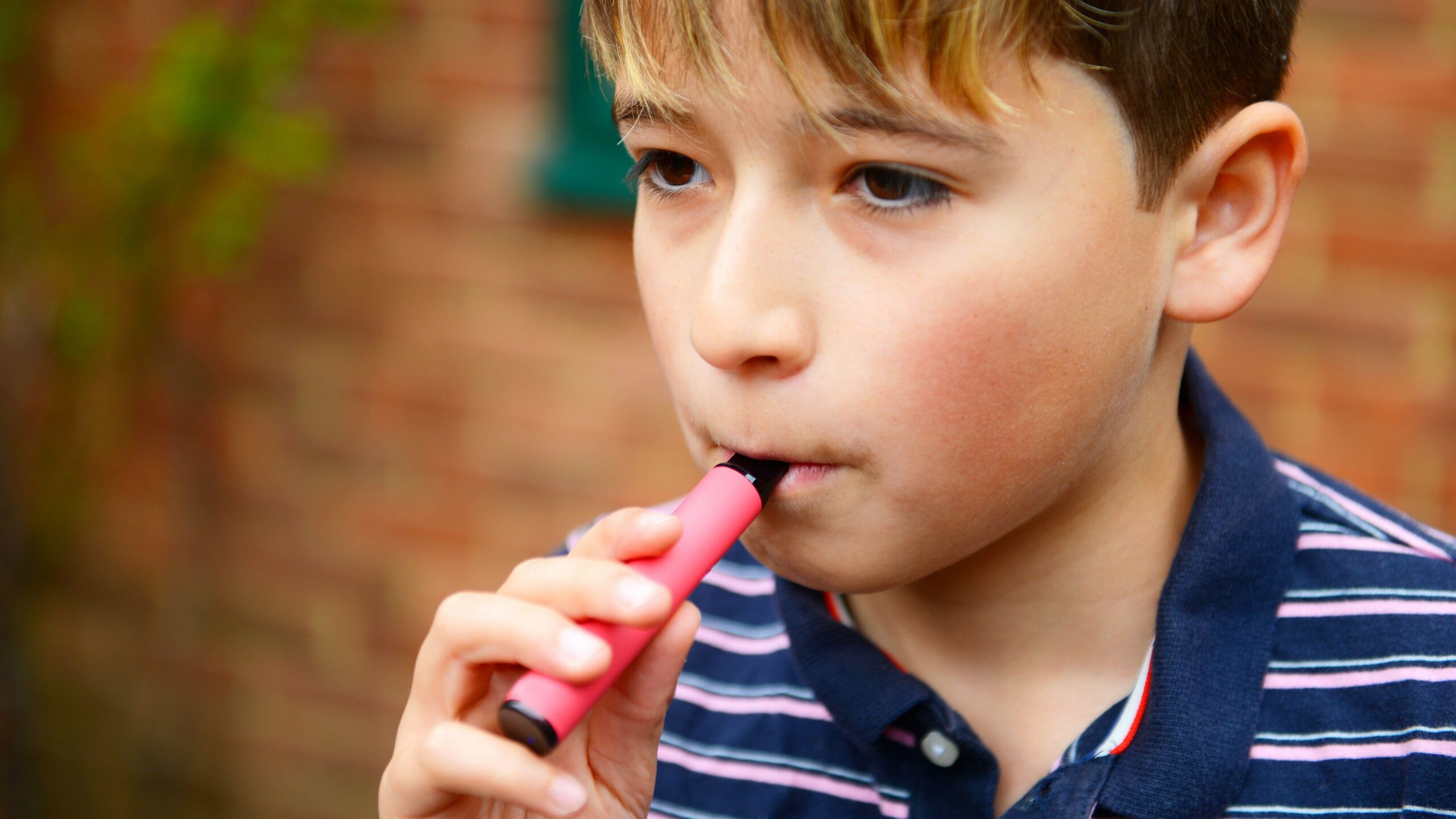
Key Conversation Tips
Here are some tips to consider before you have a conversation with your kids.
Your goal is to keep the conversation going. Nothing shuts down communication faster than yelling, judging, criticizing, or pressuring. A better approach is to listen, ask questions, and be supportive. Listen more, talk less.
Don’t freak out. Just because they know or are asking about vaping doesn’t mean they’re doing it. Pause before you respond and recalibrate if your knee jerk response is to freak out.
Look at where and when you’re holding the conversation. Are you trying to start a conversation about vaping while they’re focused on studying for their math test or playing a video game? These talks are sort of like a round of jump rope; you need to know when to jump in. Look for low-pressure moments. For example, while you’re cooking and they’re snacking at the kitchen table. Or talk about it in the car, which removes the pressure of eye contact. You know your kid, and you know when they’re most receptive to a conversation.
Keep the touchpoints quick. Quick, frequent conversations are much more effective than one big sit-down conversation. There’s too much pressure in a serious sit down, and your kids may tune you out.
Look for teachable moments. Don’t bring it back to people they know; no one wants their friends judged. But e-cigarettes are often in the news or part of an assembly at school. Make the conversation relevant, and your kid won’t feel like you’re bringing up vaping out of the blue.
Remember that it’s fine to not have all the answers. Whether it’s about vaping or about how to combat peer pressure, you’re not all-powerful. So, admit that you’re in this journey together, and you’ll figure it… together. Now, deep breath and dive in…
Sample Conversations + Responses
If you’re struggling to find the words for how to address vaping with your kids, here are some of the most common conversation threads + sample responses:
Open the conversation with a question to gauge how much your child knows.
- I read an article today about vaping. Do you know what vaping is?
- My friend was telling me that her kid is getting awful peer pressure at school to vape. Have you ever felt pressured to vape?
- My friend told me she found a vaping device, and it made me wonder: Do you know what an e-cigarette looks like?
Your child may then kick off what will be the heart of the conversation. Here are some possible responses:
If they tell you that they’re being pressured to vape:
- Thank you for sharing that with me. Peer pressure is really, really hard.
- You can try being firm: “No thanks, I’m good.” But I know that is sometimes easier said than done.
- It helps if you’re not alone. So if you can find someone else in your group to take the stand with you, that would help.
- It’s also okay to just get yourself out of there if you’re feeling pressured. Make up a reason you have to leave the conversation. And I will always be your excuse! Just text me the letter “X,” and then I can text that I need you to come home. It gives you an easy way to say, “Hey, gotta go. My parents just asked me to come home.”
If they say that they think vaping isn’t bad for you, challenge them with a few facts:
- This isn’t just harmless water vapor. It’s an aerosol of nicotine, propylene glycol, solvents, chemical flavorings, and more. They’re not well-regulated, so we actually don’t even know everything that’s in them. Putting unknown chemicals and particles deep into your lungs is not safe or healthy.
- E-cigarettes contain nicotine just like regular cigarettes, which is why they’re highly addictive.
- One pod often contains as much nicotine as an entire pack of cigarettes – or more.
- Nicotine harms your brain. It can affect your memory and concentration. And it trains your brain to be more easily addicted to other drugs.
If they point out that e-cigarettes seem harmless because they come in candy flavors:
- That’s because the tobacco/e-cigarette companies are using flavors that appeal to kids, so they’ll try them and get addicted.
- Tobacco companies have been luring kids with all kinds of flavored products for decades. Flavors just make it easier to start.
If they say, “You smoke / smoked, why shouldn’t I?”
- Hey, I’m not perfect, and I’ve made plenty of mistakes that I’m hoping you won’t make.
- I should have never started smoking. Quitting was really hard, and I don’t want you to go through that. And I’m afraid of what kind of damage I’ve done to my body.
- Quitting is really hard, and I haven’t been able to do it. I don’t want you to have to go through that someday.
Edu-Futuro’s Strengthening Families 10-14 Program, which helps teens to reduce such risky behaviors as tobacco use and vaping, is sponsored in part by a generous grant from the Virginia Foundation for Healthy Youth (VFHY), empowering Virginia’s youth to make healthy choices by promoting active, nutritious and tobacco-free living.
